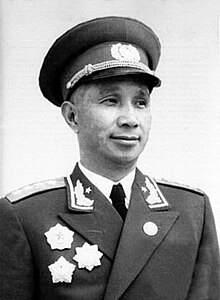Su Yu
|
Senior General Su Yu |
|
|---|---|
| 粟裕 大将 |
|

Su Yu in 1955
|
|
| Personal details | |
| Born | August 10, 1907 Huitong County, Hunan Province, Qing dynasty China |
| Died | February 5, 1984 (aged 76) Beijing, People's Republic of China |
| Awards |
|
| Military service | |
| Allegiance |
Communist Party of China |
| Service/branch | People's Liberation Army |
| Years of service | 1927–1984 |
| Rank | Senior General of the People's Liberation Army |
| Commands | Deputy commander-in-chief of the Eastern China Field Army, Chief of the General Staff |
| Battles/wars | Northern Expedition, Hundred Regiments Offensive, Second Sino-Japanese War, Chinese Civil War, Sino-Indian War |
Su Yu (Chinese: 粟裕; pinyin: Sù Yù; August 10, 1907 – February 5, 1984) was a Chinese Communist military leader. He was considered by Chinese Communist Leader Mao Zedong to be among the best commanders of the PLA only next to Lin Biao and Liu Bocheng. Su Yu fought in the Second Sino-Japanese War and in the Chinese Civil War. He commanded the East China Field Army (renamed 3rd Field Army in 1949) during the Chinese Civil War.
Su Yu was born in Huitong County, Hunan province on August 10, 1907 to an ethnic Dong family, but he considered himself a Han Chinese. He was the third child among six siblings. Su's father was Su Zhouheng (粟周亨), his mother was Liang Manmei (梁满妹), and the family depended on the 30 mu of inherited farmland for survival. By the age of 18, Su Yu entered the Hunan Provincial 2nd Normal School at Changde for his post-secondary education.
In 1926, he joined the Communist Youth League of China, and in 1927 joined the Communist Party of China. He took part of the Northern Expedition and later the Nanchang Uprising. He emerged as one of the ablest guerrilla commanders in the Jiangxi Soviet during the 1930s. He did not join The Long March because he was tasked to fight against the nationalist troops for a delaying action, and stayed in the South of Zhejiang until 1937.
...
Wikipedia
